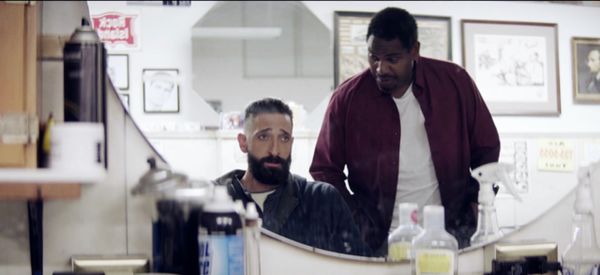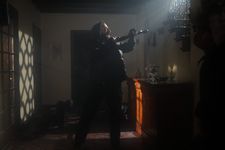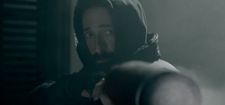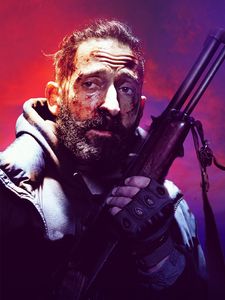 |
| Clean |
A pared down, gritty action thriller set to make quite an impact on audiences, Clean is notable as the writing début of its star, Adrien Brody. Its other writer, and director, is Paul Solet, whose first feature, Grace, wowed audiences in 2009 and who has been building up his reputation ever since. The two met on the set of Bullet Head in 2017, and it’s with that film that I began my recent conversation with Paul, in which he discussed his partnership with Adrien, what they hoped to achieve with Clean, and the technical challenges involved in bringing it to the screen.
“We really got along well on Bullet Head and we have very similar sensibilities and tastes,” he says of his collaborator. “We definitely knew right away we wanted to do something else together, so we started spitballing. Adrien had had a notion for a long time that he wanted to do something entirely independent, completely off the grid from the usual system. And, you know, we’re both both big fans of movies from the Seventies. We wanted to do something that channelled that same kind of that same kind of energy, and that same sort of gritty, unapologetically violent subgenre that really thrived in that time, and Clean was the result.”
 |
| Adrien Brody and Chandler DuPont in Clean |
They began developing it on the set of Bullet Head, he says, and then topok it from there.
“I went out to visit him in Manchester while he was doing Peaky Blinders, and we were doing a looping session there for Bullet Head while he was working. We just walked around Manchester. And you know, it's just really inspiring, being in this environment that has so much history, in this industrial environment. We just walked and walked and walked. He and I are both from the East Coast, we need to walk, you know? There’s not a lot of driving. And so we just kind of walked around and talked and spitballed and drank a lot of caffeine and started sort of talking through it.
“I would make sure I would visit him. I was back and forth between New York and LA at the time, and when I would be in New York, I would make sure I hit him up and we would just walk around the city, and we’d do the same when he was in Los Angeles. We’d go to his his secret restaurant spot that he likes to go to. And it started to develop. Adrien definitely works from the inside out, and also is obviously completely brilliant actor, a craftsman. But I think he had a sort of emotional, visceral vision for this character that he wanted to play. My job was to help him realise that, and ask the right questions to tease that out and find the right structure and language to bring that forth. And then we had this back and forth, refining and refining and refining all throughout the process.”
The film is dedicated to their fathers. How did that come about?
 |
| "I think thematically it's very much a movie about being a dad" - Paul Solet |
“You know, I think thematically it's very much a movie about being a dad. And I think we're both very close with our fathers. It's great, actually, when we premiered the film, we were able to make a dedication to our parents in person, which was really nice to be able to do. It was really special to me to have my dad at the festival.”
I tell him that, for me, the initial monologue in the film very much has a Taxi Driver vibe to it. There are some parallels in story as well. Were they wanting to take on that kind of familiar subject matter but do something a little bit different with it? There’s a different emotional take-away.
“Yeah,” he says. “It's a collaboration. I think there are things in Clean that are very personal to me, there’s things that are very personal to Adrien. There was no voiceover to begin with. Adrien actually wrote that voiceover himself and and so you know, those are the themes that he most connected with. I connected with him I think on some of the spiritual themes.
“As far as the familiarity goes, I think of a movie like this as a sort of a blues song, you know? The chord changes are pretty familiar, you know, whether it's Buddy Guy or Robert Johnson. You're going to get something completely different but you're working within the same sort of broad structure. And I like that about a film constructed like this. When you have someone as gifted as Adrien as a partner in the construction and execution of a film like this, there's real value in having a sort of unpretentious simplicity, sort of the palette that you're working in. And it just allows him to really stretch. And he did. I mean, his performance is just beautiful.”
 |
| Trouble in the neighbourhood |
I say that it felt to me that that simplicity let him focus a lot more on mood and atmosphere, with the result that it feels like a very textured film. Was that something that came from the writing process, or more as he was directing and Adrien was acting?
“That's a great question,” he says. “I mean, there are definitely parts of the writing and directing processes that are very much separate, and you take one hat off to put on another, but those things sort of feed each other and are also inseparable, in some important ways, so it's both really. I think my goal is to always have a script before you go into production, that the key themes and the rhythms are baked into, before you start, and if you have that, then you're free to build. It's not to impose something on it and to become rigid, but to have a sense of, you know, what is the texture and the tone of the scene before you get there. And I think Clean is very much as envisioned, in some important ways, and I think in some other ways that it grew and changed.”
It doesn’t seem like too much of a spoiler to note that there’s a long sequence fu;ll of violent incidents at the end. How much can a sequence like that be scripted, and how much does it need to be developed after finding a location and working out what can be built around it structurally and physically?
 |
| An history of violence |
“You can have a sort of broad strokes, creative, emotional, tonal vision for a thing,” he says, after thinking for a moment. “You could have a sense of the mode of violence, the weaponry, the tone and themes you are looking to bring out with it. Clean is ultimately not a movie that is celebrating violence. It's also quite entertaining to watch the violence, which is a tricky thing to navigate. But definitely, with a film that is made independently without a big budget, the goal is to understand upfront what your limitations and just embrace them and turn them into assets. That's the only way to make a film like this, and how to be good. And that's very much about location. It's about personnel.
“You know, we were blessed to have our stunt coordinator Manny Silverio, an incredibly brilliant, experienced stunt player. And Adrien is very physical actor, you know? Adrien is in up in the mix. Adrien wants to work, he is as adept physically as he is emotionally as an actor. You don't often have those two things. And so Adrien and Manny have a long term relationship going back I think, probably, the Spike Lee movies they made, and so they have history and shorthand already. And so those guys worked together to choreograph their fight scenes.
“It's not arbitrary, you know? Those things come from characters. Who is this guy? If what you're trying to display is, you know, this is a person who has an unusual not only aptitude for violence, but emotional relationship with violence, those are things that affects fight choreography, and that's a fucking awesome thing to be able to do. So if you have people that can realise that stuff, and you have your location, and everybody's working together to figure out, okay, with these resources, let's dance. And that's how we go.”
 |
| Returning to the old ways |
And something that struck me as quite brave for a relatively low budget production was working with snow. It adds a lot to the mood of your film but there are always a lot of things that can go wrong with it.
“You know, you really are a person who understands physical production.” he says. “It is really challenging. People spend a lot of money to create snow, to make a look like we had in this movie. It was even braver, or more insane, you know, you can determine which, on Clean, because we were just working in upstate New York in the middle of winter. New York in the middle of winter is a really, really brutal place to work. I’ve worked in Bulgaria in the middle of winter, and Colorado, and the middle of winter in upstate New York is really challenging for weather, it's really, really rough. And so we didn't make the snow, the snow was there, and we were sort of thrilled to have it aesthetically and the crew just got its shit together. I mean, that's what it is. Everything is very slow and there are all sorts of other considerations that have to be made just to start to make the set a workable environment, but it is beautiful. I mean, it really is so appropriate for the movie.”
We’re nearing the end of our time, so I ask him about his on-set relationship with Adrien, how much his co-writer remained involved in steering the film and whether or not his own acting experience helps him with directing it.
 |
| Clean poster |
“I don't have real acting experience,” he says modestly. “I've taken acting classes because I think directors should do that, they should understand what they're asking somebody to do, but I'm not an actor. My process with Adrien is, you know, when you're lucky enough to have someone who is as brilliant as he is, it's just about communication and doing your best to protect him from anything that could distract him, which is very complex thing to do when he's also a producer, a writer on film, you know. It's to his great credit that he was able to deliver a performance like this while managing all the other considerations that you have when you're also producing a film. And, you know, writing a film and thinking about how are you going to score a film.
“A lot of the movie is made in the writing, in the conversations about what it is and in the relationship and in the shorthand that you develop. And then my principal job is to curate environments and manage them in such a way that Adrien can do his best work within them. And while doing that, to keep an eye on the broader emotional map of the film, so that he doesn't have to track that stuff in real time. So that he can stay as close to where his feet are as possible. I can tell you, it really spoils a director to have someone like Adrien, it really is astonishing. He’s astonishingly gifted, and in and not just in the ways that are obvious on screen. He's technically gifted, he's physically gifted, and he's really committed and studious. You know, he goes home at night and he works. There’s really nothing a director could could ask for from a collaborator other than that. I mean, that's the best.”
Clean is available on digital from Monday, 4 July.





















